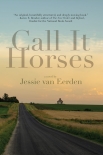Call It Horses by Jessie Eerden (good books for high schoolers txt) 📗

- Author: Jessie Eerden
Book online «Call It Horses by Jessie Eerden (good books for high schoolers txt) 📗». Author Jessie Eerden
Then—the irreversible moment when the meat turns and the maggots hatch and the bone snaps in two.
Headlights traveled the bare mantel through the window, then extinguished. Everyone was already present, except Mave, but she wouldn’t drive over, she’d walk, or stumble, in her unlaced steel toes. I stood and handed the strung-out Tuffie my half-empty Coors; I threaded back my hair so I could see into the kitchen, through the screen door to the black gravel dark beyond it. A figure formed itself on the porch. I’d forgotten to turn on the porch light, so it formed from the subtler light of the kitchen. A woman with huge hair stood with a hand at her belly.
“Is this the get-together?” the woman called into the kitchen, and in she came, her dress straining with its freight. Her Army jacket too big. Onto the table she spilled the beet crop that I’d worried was a dead baby.
“My god,” I said at her dress.
“Thought maybe I could join you all?” she said. “I have these to trade.” She told me her name. That looseness in her stance, in her legs, in her joints, so sultry. The combination of her radiating sexy youth and the beet stains on her hands and up her arms immediately called to mind the paintings I’d seen that day of Darrell’s wake. I somehow knew she had painted the walls of the Train Cave, which I’d told no one about. The bright violent orgy of lines, bodies, rivers I had thought stunning. How? How could that be? “I heard there was a get-together.” And I knew, of course, though she did not tell me, that she was Dillon’s wife. “Looks like you got beer?”
Belinda and her nursing boy appeared beside me, Clarissa in the lovely scarf. They didn’t know who Nan was, and Clarissa said, “Sure, come on in. Those beets are huge, gosh. I’m Clarissa, this is Belinda and little Roger, and this is Frankie.”
Nan locked her gaze on me, drank me in, my heavy hanging hair, my old jeans, my mouth shut tight hiding a black-coated throat. That brief, fragile lightness I’d felt all dissipated as this woman sucked me back down. How had she heard of the co-op, from whom had she stolen the beets, how had her hands painted the limestone so beautifully and strangely? I said nothing as Clarissa and Belinda reentered the living room and Nan took steps to follow. I looked at her as though in her dress she had in fact hauled in a dead thing. She came close, a couple of feet from me; she smelled of paint thinner or diesel or something aerosol.
“So you’re Frankie,” she said quietly. “You’re the one.” Her gaze was open, and that starved look marked her even then as she measured me against any and all of the stories Dillon had told her. And what had he said? Who had he told her I was? His second self? His shadow?
In my thick jealousy, I dismissed her hunger pangs, and the question of her, and simply watched her snake-body walk into the living room with the others, where God was a woman keening and healing the sick, drawing up water from the well to carry, the deepest water, the deepest well.
“WHAT’S THE WORST THING YOU EVER DID?” Nan remained enamored with truth-telling in the car. She had erected a boundary of bag and floormat between her and Ellis. “And what’s the best thing?”
“Nannette,” said Mave, “you are a veritable font. Sometimes quiet is welcome.” She looked tired from the lake detour and the over-spilling of truth, and, by her voice, I could tell she’d taken some codeine.
“And what if it’s the same thing?” said Nan. “Like someone says, who do you hate the most and who do you love the most, and often it’s the same person. I think that’s often true.”
“Are we sure this radio doesn’t work?” Mave twisted the knobs.
“For me it’s one and the same. The worst and the best. Have you ever been in an abortion clinic? There’s no windows. And there’s a machine sucking sound you don’t get out of your head.” Her voice was steady and intent on its mission to get everything out. Looking at her young face in the rearview, I even admired her for taking on this mantle. Mave moved her hands over the radio in hocus pocus, willing it fixed.
“They suck you clean. But if I hadn’t? What then? I had no way to feed myself. My kid would have ended up like me.” Up came Nan’s head between the seats facing Mave. “Scared to live.” Nan receded like ocean. “I did it out of love, but it was the worst thing I ever did.” She was quiet and then there was only road hum, since neither Mave nor I responded in kind. The discount store tractor trailer we passed treaded out its brief roar. “She knows it was love,” Nan said. “Or he. Wherever my kid is.”
In a few miles, at a gas station outside of Memphis, Mave needed the bathroom. Nan and I stayed in the car as Mave assembled her network and got out. She looked at me through the window rolled halfway down, said, “I was just thinking, you should make sure everything is dated in the book. People will wonder who said what when. And with what inflection—inflection is everything. That





Comments (0)